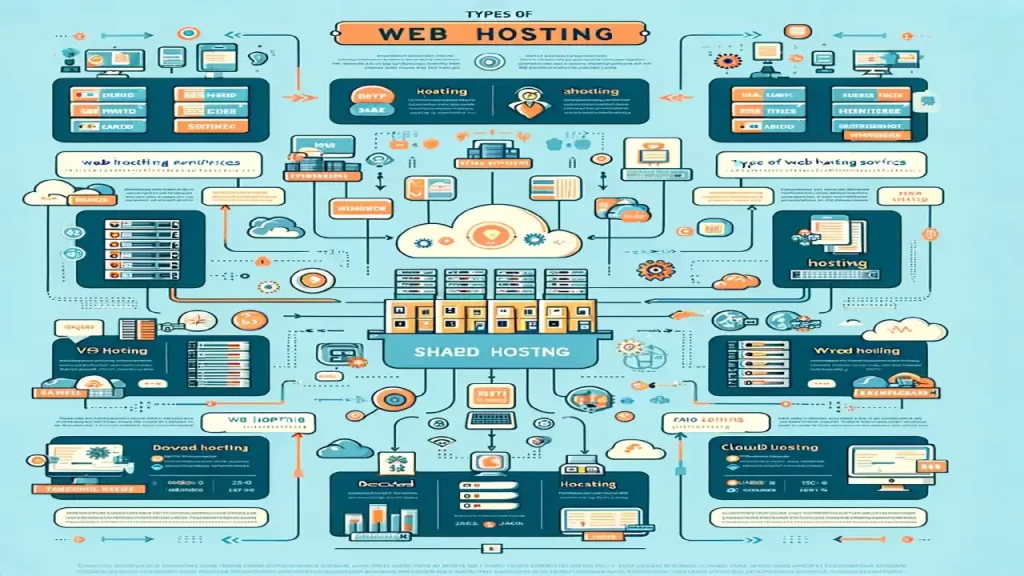Embarking on the journey of creating or expanding your digital presence, the choice of a web host, specifically understanding the “Types of Web Hosting Services,” emerges as a pivotal decision. This selection process is far from trivial; it necessitates a thorough understanding of the diverse hosting solutions at your disposal. Each website is a unique entity with its own set of requirements, and aligning these needs with the appropriate hosting service can significantly influence the ultimate success of your online venture
Explore the Types of Web Hosting Services
Exploring web hosting services uncovers a spectrum of options, each suited to different needs. From the cost-effectiveness of shared hosting to the robust control of dedicated servers, and the flexibility of cloud hosting, there’s a solution for every type of website. Understanding these options enables you to select the ideal hosting that aligns with your site’s demands and growth trajectory.
– Dive Into Free Web Hosting
At first glance, free web hosting appears as an enticing proposition, promising a cost-free solution to your hosting needs. Yet, the adage “there’s no such thing as a free lunch” rings particularly true here. Dominated by advertisements and offering a bare minimum in terms of features, storage, and bandwidth, free hosting is a choice fraught with compromises. Primarily suited for diminutive sites with minimal demands, it falls short for businesses or any site requiring stability and efficiency.
– Shared Web Hosting: A Closer Look
Imagine a single server, a repository of myriad websites. This is the essence of shared web hosting. The number of sites it accommodates varies, hinging on the provider’s infrastructure and pricing models. While shared hosting stands as a dependable option for a wide array of sites, it’s not without its limitations. Resource-intensive sites might find themselves at odds with shared resources, potentially facing suspension. Thus, a diligent evaluation of providers is paramount to find a balance between cost, performance, and reliability.

– Reseller Web Hosting Unveiled
Reseller hosting carves out a niche, enabling clients to don the hat of a web host themselves. Often chosen by web design firms for hosting client sites, it mirrors shared hosting but on a potentially smaller scale. This option fosters a sense of independence and flexibility, appealing to those with specific, client-focused hosting needs.
– The Realm of Virtual Dedicated Servers
Straddling the line between shared and dedicated hosting, virtual dedicated servers offer a tailored resource allocation, ensuring a fixed share of CPU power and bandwidth. This model introduces “root” access, granting users a higher degree of control and customization—a boon for those seeking more than what shared hosting can offer, without venturing into the realm of full dedication.
– Dedicated Hosting Service: Total Control
Dedicated hosting epitomizes exclusivity; a server devoted entirely to your website. It bifurcates into managed and unmanaged services, catering to varying levels of expertise and involvement. The allure of comprehensive control is tempered by a higher price point, making it a consideration for sites outgrowing the confines of shared or virtual options.
– Colocation Web Hosting: The Self-Hosting Path
Colocation offers a unique proposition: you own the server, and a facility provides the physical space, power, and connectivity. This model demands a hands-on approach, ideally suited for those with the technical acumen to manage their server directly, seeking the infrastructure benefits without the full service suite of dedicated hosting.

– Clustered and Grid Hosting: Beyond Single Server Solutions
For websites whose demands eclipse the capacity of a single server, clustered and grid hosting present scalable, robust alternatives. These configurations distribute the hosting load across multiple servers, enhancing reliability and performance for high-traffic or resource-intensive applications.
– Home Server Hosting: The DIY Approach
The most personal of hosting options, home servers, offer a hands-on, intimate approach to web hosting. This path requires a substantial investment in hardware and bandwidth, not to mention the technical prowess to manage and maintain a server independently. It’s a labor of love, suited for those with a deep investment in their web projects and a willingness to tackle the challenges of self-hosting.
Making Your Choice
Navigating the vast seas of web hosting options can seem daunting, yet armed with a clearer understanding of each category, you’re better positioned to make an informed decision. For the majority embarking on digital ventures, shared, virtual, or dedicated hosting will serve as the cornerstone of their online presence, each offering a distinct balance of performance, control, and cost.
As you stand at this crossroads, consider not just the present needs of your website but its future trajectory. The ideal host is one that not only addresses your current requirements but can scale and adapt as your site evolves.
Choosing the right web host is more than a technical decision; it’s a strategic move that can shape your website’s performance, user experience, and ultimately, its success. Dive deep into research, weigh your options, and select a partner that aligns with your vision and values. The path to digital success begins with the right foundation, and your web host is a critical piece of that puzzle.
FAQs
The major types of web hosting services include Shared Hosting, VPS (Virtual Private Server) Hosting, Dedicated Hosting, Cloud Hosting, Colocation Hosting, and Managed WordPress Hosting, each catering to different use cases and users’ specific needs.
Your choice between shared and VPS hosting should depend on your site’s technical requirements, budget, and level of server expertise. Shared hosting is most suitable for beginners with small to medium sites, due to its cost-effectiveness. In contrast, VPS hosting is apt for users requiring more system control and complete site access with a private web server for larger, content-heavy sites, or web applications.
Cloud and dedicated hosting serve different business sizes and requirements. Cloud hosting provides high flexibility and scalability, making it a top choice for businesses expecting change or rapid traffic rates.
Reseller web hosting allows agencies, business coaches, or web enthusiasts to operate as their web host for specific vendors. This part of the working agency is beneficial for the people behind other faculties to pay for design and web outcomes and monetize web space that can be more financially valued or provided with inclusive custom terms of the trade work.
Yes, it is typically possible to switch between web hosting types as your business, and web site foundation demands a type of reselling or might change.
************************************



